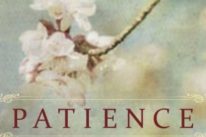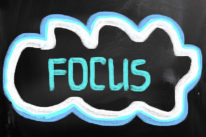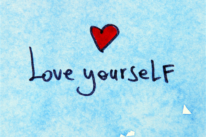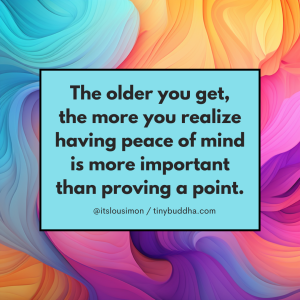
“Have respect for yourself, and patience and compassion. With these, you can handle anything.” ~Jack Kornfield
I find it hard to do things I know are good for me, harder than anything else in my day-to-day life.
Yoga, meditation, journaling: these have all been invaluable tools during my personal journey, yet I have to will, sometimes fight myself in order to do them.
It’s not that the activities themselves are hard (although yoga can be intense). It’s the motivation, the internal debate that starts up every day that I struggle with. Afterward, I feel great, more in touch with myself and far more at peace. But to get there, it’s a psychological mission.
I used to think it was just me—that everyone else sat down to these activities with an eager mind and an open heart, especially people who write about these things, like I do, and practice them daily, like I want to.
The fact that I was less skipping joyfully to and from these activities and more dragging myself with gritted teeth left me feeling like a fraud, which meant I wanted to do these things even less.
Over time, I learned more about self-acceptance. I learned to accept that this was me, the way I am, and that perhaps I will always find it difficult to sit down and do these things, whether it makes sense or not. Yet, I still felt alone with my struggles and, therefore, afraid to really talk about them with anyone else.
Last week, I was talking to a friend of mine about challenges he was having with a course I run. He was saying he felt resistance, he didn’t know why, and that it seemed like everyone else found sitting down and doing the work a walk in the park. They could just do it, whereas for him it was a daily battle.
That sounded familiar…
And as soon as I wasn’t trying to hide the resistance, as soon as I let myself talk about it openly, I could think more clearly about why I felt that way, and what was behind that resistance. And out of all those reasons came the realization: the resistance is on my side; sometimes it’s just misguided.
Resistance to Things Changing
When we engage in practices like journaling, meditation, or even exercising, we might feel resistance to change.
This resistance might conflict with a desire for healthy change—the desire that prompted us to start up that activity in the first place—but it has a very healthy grounding behind it: change can be scary. Change is about going into the unknown, while what we have right now is familiar and comfortable, even if we’re not 100% happy with it.
Resistance to What We Might Find
Sometimes self-knowledge can be like charting new, undiscovered land. You think you’ve explored it all, then you turn a corner and there are miles and miles of untouched terrain still to go. You have no idea what might be lurking under the rocks out there, and sometimes it feels safer to just leave it untouched.
When we engage in activities that are good for our well-being, self-acceptance, and self-knowledge, we risk relaxing our defenses and potentially finding out things about ourselves that we might not like. The most important part of self-growth, though, is learning to acknowledge and accept those things for what they are, even to feel compassion for them.
Resistance to Being Nice to Ourselves
This can be a tricky one, as often it’s an unconscious core belief: that we don’t deserve to spend time on and be nice to ourselves. As an abstract concept, it’s a no-brainer: of course people deserve to be nice to themselves.
But when was the last time you consciously did this? Taking time to nourish our emotional and spiritual well-being, taking time to get to know ourselves in more depth can be a real challenge, even if we think other people deserve that.
If we were brought up in particularly critical households, if a lot of value was placed on our achievements over our happiness when we were younger, or if we grew up in environments where these practices were frowned upon or ridiculed, we might feel a lot of resistance to being nice to ourselves.
It might conflict with the messages we received as children, which we felt we needed to obey at the time to be loved. As adults, these messages are translated into core beliefs about ourselves, even if we don’t apply them to other people.
But again, they are there to protect us, and, although they might now be obsolete, they are still working to make us loveable to the people we used to depend on.
Resistance to Trusting a Process
Resistance might come from doubting an activity’s ability to really do us any good. I certainly have a mini-cynic who lives in my head and scoffs at my yoga, scorns my journaling practice and says “Really, aren’t you above this hippy nonsense?”
I keep telling that voice that no, I’m not above this hippy nonsense, but it still pipes up to have its say.
Trusting a process—especially a slow process that might not contain any obvious light-bulb moments and requires time and patience—is difficult.
We might not feel like we are in control; it could seem like we’re putting our all in and getting very little in return. I don’t think I’ve ever had any major epiphanies in my personal development; instead of a cascade, I’ve experienced steady, slow drips.
I can’t think of any major changes that happened day-to-day, but when I look back on a few years ago, the difference is enormous.
Resistance to Our Own Humanity
Recently I started regular “morning pages” style journaling (writing 3 pages stream-of-consciousness every morning) after a few months off. I was shocked to find that, although I started off my journaling session feeling very virtuous for having overcome my resistance, I became increasingly anxious while writing.
I couldn’t understand how, after years of practice, I could still be feeling anxious about journaling. “I should be past this,” and “I should be self-accepting enough to not feel anxious when I journal,” were the dominant thoughts that fed my anxiety further and created resistance to opening up my laptop the next day.
When we’ve been doing something for a certain amount of time, we can build up expectations around our “performance.” We expect ourselves to be self-acceptance ninjas, spreading peace and serenity to all we come into contact with. We expect those emotions on the “negative” end of the spectrum to disappear.
But of course it’s not like that. I get anxious, I feel resistance, and that’s part of what it means to be me. It’s part of what it means to be human.
An important part of my journey is learning to accept that those things might never change, and to have respect for my resistance and the many ways it is trying to protect me. Our resistance can be infuriating, frustrating, and downright inconvenient, but it’s developed for very good reasons.
When we have respect for ourselves, with patience and compassion, we can handle anything—especially resistance.
Photo by Ashley Campbell Photography
About Hannah Braime
Hannah Braime is a coach and writer who believes the world is a richer place when we have the courage to be fully self-expressed. She shares practical psychology-based articles, tools and resources on living a full and meaningful life over at Becoming Who You Are. Get free access to workbooks, audios and much more when you join the community.













 Though I run this site, it is not mine. It's ours. It's not about me. It's about us. Your stories and your wisdom are just as meaningful as mine.
Though I run this site, it is not mine. It's ours. It's not about me. It's about us. Your stories and your wisdom are just as meaningful as mine. 